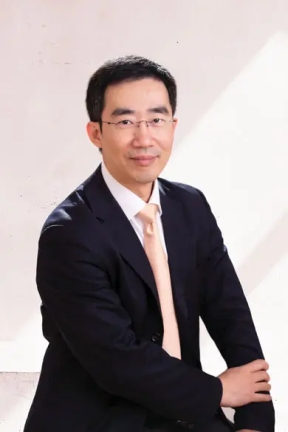WRITER JARED PEARMAN, MAGNIFISSANCE.COM
“Taiji has also influenced Chinese people’s way of thinking. For example, we believe everything will move in the opposite direction when it reaches the extreme; therefore we should take a step back today in order to move two steps forward tomorrow.”
—Dr. Tianliang Zhang
Tianliang Zhang is a Chinese history professor at Fei Tian College in the United States as well as the host of the popular Chinese-language TV program A Grand View of Chinese History. Broadcast over nine years on NTD Television, the program covers a wide range of topics spanning China’s great dynasties.
Zhang credits the success of the program to his insightful view of history developed after becoming a practitioner of Falun Gong (also known as Falun Dafa), a traditional practice of meditation and cultivation.
Enlightened by the wisdom of the practice’s principles of Truthfulness, Compassion, and Forbearance, Zhang came to gradually realize how much his view of history had been skewed by the Marxist ideology he learned in China. As his perspective of history evolved, he began to teach others the principles he understood.
His historical insights have also led to the success of his Chinese-language YouTube channel, Dawn Time. Focused on current affairs, the channel has attracted more than 90 million views in less than three years.
You studied science and engineering in university, but now you focus on literature and history. What connects the two areas of study?
The liberal arts and the sciences were divided by modern society, but I believe that a successful person should have both logical thinking and the ability to express himself skillfully. The former is the result of training in science and engineering, while the latter comes from the study of literature and history.
In ancient China, people received a generalist education that covered a breadth of subjects. The greatest leaders in Chinese history were generalists. Emperor Taizong, Yue Fei, Cao Cao, and Wang Yangming were all accomplished military strategists and warriors, but also politicians, poets, and calligraphers. They could get on a horse to fight, and then get off to rule the country. Many of the greatest artists in the West were also generalists, such as Michelangelo and Leonardo da Vinci, who were painters, sculptors, architects, engineers, and scientists.
How can one become a generalist?
I believe the study of knowledge can be divided into three levels. The first level is the study of the relationship between humans and gods through theology and philosophy. Chinese historian Sima Qian once said, “To explore the relationship between the Way of Heaven and the Way of Man, I need to have a thorough understanding of the course of historical development and the changes involved therein, thus I can present my own system of analysis of the events in the past.” This is a research attitude that spans time and space to explore the nature of the world and the eternal laws of the universe.
The second level is the study of the relationship between people, such as politics, law, sociology, psychology.
The third level is the study of the relationship between humans and the material world, such as physics, chemistry, and computers.
I think people need to expand their knowledge. Even if they’re studying science or engineering, it’s beneficial to learn some history and philosophy. Equipped with a philosophical foundation, they’ll be able to find the path to make breakthroughs in those fields.
For example, Einstein’s theory of relativity was born after his philosophical breakthrough. One day, he took the streetcar to work and passed by a famous clock in Bern, Switzerland. He suddenly thought of a scenario: if his streetcar drove away from the clock tower at the speed of light, the clock would stop while his watch in the streetcar would continue running normally.
From that momentary thought, he developed the theory of relativity, which overtook Newton’s three-hundred year old concept of space-time. His theory also broke through the conventional methods of scientific inquiry that had stifled the physics community.
The theory of relativity claims that time changes based on the speed of movement. The faster you move, the slower your time will pass. At that time, Einstein’s ideas existed only in his mind and couldn’t be verified. Yet because his view of time and space evolved, the way he looked at the universe also changed. This is why he could make such revolutionary breakthroughs in science.
The formation of my view of history, which breaks through the current framework of education in the field of history, also results from a change in my understanding of the universe through my practice of Falun Gong.
The circle is a common motif in Chinese arts. What is the significance of circles in traditional Chinese culture?
Chinese culture grew out of Taoism. The legendary Yellow Emperor, who founded the Chinese civilization, was a Taoist cultivator; therefore Chinese culture has had a strong Taoist connection from its earliest beginnings.
The highest concepts in Taoism originate from the concept of Taiji, which is represented as the circle of yin and yang. It refers to the law of the universe and the nature of life. The two substances of yin and yang coexist inside the circle.
Taiji influences all aspects of Chinese arts and history. For example, Taiji is round, and the Chinese view of time and space is also round. The Chinese calendar uses a sexagenary cycle chronology which repeats cyclically every 60 years. You often see the circle design in doors and windows in Asian architecture and gardens. The movements in classical Chinese dance are also based on circles.
Taiji has also influenced Chinese people’s way of thinking. For example, we believe everything will move in the opposite direction when it reaches the extreme; therefore we should take a step back today in order to move two steps forward tomorrow.
Please elaborate on this traditional Chinese concept of taking one step back in order to move two steps forward, especially when everyone aims to move straight forward in today’s competitive society.
According to the principle of Taiji, when yin reaches the extreme, yang will appear; when yang reaches the extreme, yin will appear. People in ancient China understood that everything reverses once it reaches the limit. Based on this philosophy, they’d find it wise to retire after achieving success.
For instance, the great strategist Sun Tzu, the author of The Art of War, once led the army of the state of Wu to capture an enemy capital. It took five battles for his smaller army to defeat the much larger enemy army with surprisingly few losses.
After returning victorious, the king of Wu wanted to reward Sun Tzu with a loftier position. Sun Tzu refused and insisted on retiring. When he left the state of Wu, he told his fellow army commander Wu Zixu: “Do you know the way of Heaven? When summer passes, cold times arrive; when spring departs, autumn comes. Our state is strong and the borders are secure. The king will naturally grow prideful and indulge in entertainment. If you don’t retire after success, you’ll be in trouble in the future.”
Sun Tzu left the State of Wu and distributed the money the king gave him to people he met along the way. Yet Wu Zixu didn’t listen to his advice, and when the state of Wu was defeated by state of Yue years later, he was forced to commit suicide.
This concept of retiring after success was common knowledge among ancient Chinese people.
This story is from Magnifissance Issue 111
ORDER NOW >>> https://store.magnifissance.com/products/issue-111-the-beauty-of-balance
Source: https://magnifissance.com/beautiful-minds/tianliang-zhang/
Editor’s Note: Dear readers, do you know that Falun Dafa, originally from China, is currently practiced by people in over 100 countries? But in China, since Jul. 20, 1999, Falun Gong is defamed, slandered and persecuted due to the Chinese Communist Party’s fear of Falun Gong’s rapidly growing popularity. Jiang Zemin, former head of the Chinese Communist Party (CCP), perceived the spiritual discipline’s growing popularity as a threat to the CCP’s atheistic ideology.
To learn more about the persecution Falun Gong practitioners are subjected to in China, visit http://faluninfo.net/.
For more information about the practice or to download Zhuan Falun, visit: www.falundafa.org. All books, exercise music, resources, and instructions are available completely free of charge.




